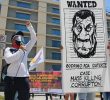Sobbing while delivering his speech under the late morning sun, Datu Matunao of the Matigasalog tribe in Sitio Bermuda, Mangayon village in Compostela town said, “Mag-unsa na lang mi? Among mga kayutaaan na-bar down na. Ang kabukiran nanga-opaw na tungod sa pagpangawkaw sa mga dagkong kompanya sa logging (What will happen to us now? Our lands have been destroyed, our mountains denuded by these big logging companies).”
By MARILOU AGUIRRE-TUBURAN
Davao Today
MONTEVISTA, Compostela Valley, Philippines – At exactly 11:40 AM, 5,000 people from the towns of Monkayo, Nabunturan, Compostela and Montevista in Compostela Valley province and the towns Baganga, Cateel and Trento in Davao Oriental occupied the Montevista Highway and set up human barricades, blocking all possible entry and exit points of vehicles coming from the North, South and East.
They have one common goal: hold the Aquino government accountable for what happened to the victims of the most deadly typhoon that ever hit Mindanao in the last decades, Pablo.
“Upat ka oras ko nagbaktas aron lang makanaog gikan sa bukid. Aron lang makapadayag sa mga mulo namong mga lumad (We walked for four hours just to come down from the mountain. We are doing it just to vent out our complaints),” said Datu Matunao of the Matigasalog tribe in Sitio Bermuda, Mangayon village in Compostela town.
Sobbing while delivering his speech under the late morning sun, the poor tribal leader said, “Mag-unsa na lang mi? Among mga kayutaaan na-bar down na. Ang kabukiran nanga-opaw na tungod sa pagpangawkaw sa mga dagkong kompanya sa logging (What will happen to us now? Our lands have been destroyed, our mountains denuded by these big logging companies).”
He blamed large-scale mining and logging corporations for contributing to the destruction brought by Pablo. And he blamed more the Aquino government for allowing these companies to operate in the country.
Pablo resulted to 1,067 plus deaths while 844 remain missing. Over 6 million individuals have been affected.
“Pablo is not the will of God. It happened because of the widespread abuse and plunder of our natural resources by the few elites,” said Barug Katawhan, a movement of the victims of typhoon Pablo.
In its statement, Barug Katawhan said Pablo was aggravated because of the “anti-people and anti-environment” policies of Aquino government such as the Integrated Forest Management Agreement (Ifma), Executive Order No. 23 (log ban), Philippine Mining Act of 1995, Executive Order No. 79 (mining) and land-use conversion.
Environmental rights group Panalipdan earlier called on the Aquino government to cancel all logging permits covering 82,443.39 hectares which it granted to 16 logging companies such as the Matuguina Integrated Wood Products, Inc., Picop Resources, Inc., and La Fortuna Mahogany, Inc.
Ifma, according to Panalipdan, was also exempted from Aquino’s ‘useless’ EO 23.
Barug Katawhan said that because of widespread land-conversion, rice farming decreased to 30 percent as plantations for bananas and palm oil were expanded. About 100 hectares of residual forest in New Bataan and Maragusan towns were converted to banana plantations while in Laak town, forest cover has been depleting with the expansion of plantations for biodiesel.
The Aquino government has granted 23 Mineral Production Sharing Agreements to large-scale foreign and local companies, allowing them to operate within a million hectares of land in Southern Mindanao. Meanwhile, it granted 150 exploration permits.
“We demand the Aquino government to cancel all logging and mining permits, as we demand him to take responsibility over our tragedy,” said Carlos Trangia, spokesperson of peasant group, Kilusang Magbubukid ng Pilipinas in Compostela Valley.
Trangia has scored the Aquino government, saying it not only paved the way for environmental destruction, it also deprived farmers, lumads and the people from national patrimony.
Barug Katawhan said the Aquino government contributed to the deaths of thousands and the destruction of billions-worth agriculture and infrastructure by implementing one-sided policies.
“These policies aggravated the people’s poverty and vulnerability to natural calamities such as Pablo which is a result of climate change,” it said.
Trangia also lamented that Pablo victims have not received genuine relief and rehabilitation despite the billions of assistance poured by local and international donors for the Pablo victims.
He said that victims, especially in interior villages or remote areas, have received little help while sacks of rice are stocked in NFA bodegas. Some, if not most, victims also received NFA rice despite tonnes of first class rice donations.
“Asa naman ang dakong hinabang nga gihatag sa ubang mga nasud ug ubang mga organisasyon? Asa naman ang 18 million nga calamity fund sa among probinsya? Nganong wala man namo kini nabati? (Where are the aid given by other countries and organizations? Where is the 18 million calamity fund for our province? Why are we not even feeling any help?)” Roel, a driver from Binondo village in Baganga, Davao Oriental said.
His family’s house was totally damaged by Pablo. But he said they have not received genuine rehabilitation from the government. Now, they are still living in a makeshift tent, along with other local residents.
Barug Katawhan has held the Aquino government and big, foreign corporations accountable for Pablo’s devastation. (Marilou Aguirre-Tuburan/davaotoday.com









